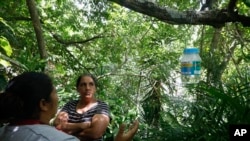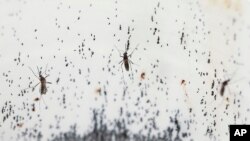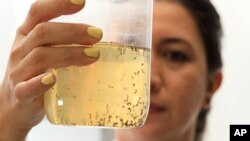For decades, preventing dengue fever in Honduras has meant teaching people to fear mosquitoes and avoid their bites. Now, Hondurans are being educated about a potentially more effective way to control the disease — and it goes against everything they’ve learned.
In Honduras, where 10,000 people are known to be sickened by dengue each year, Doctors Without Borders is partnering with the mosquito program over the next six months to release close to 9 million mosquitoes carrying the Wolbachia bacteria.
Dengue defies typical prevention

Traditional methods of preventing mosquito-borne illnesses haven’t been nearly as effective against dengue.
“We need better tools,” said Raman Velayudhan, a researcher from the WHO’s Global Neglected Tropical Diseases Program. “Wolbachia is definitely a long-term, sustainable solution.”
Scientists surprised by bacteria
The Wolbachia strategy has been decades in the making.
The bacteria exist naturally in about 60% of insect species, just not in the Aedes aegypti mosquito.
“We worked for years on this,” said O’Neill, 61, who with help from his students in Australia eventually figured out how to transfer the bacteria from fruit flies into Aedes aegypti mosquito embryos by using microscopic glass needles.

Around 40 years ago, scientists aimed to use in a different way: to drive down mosquito populations. Because male mosquitoes carrying the bacteria only produce offspring with females that also have it, scientists would release infected male mosquitoes into the wild to breed with uninfected females, whose eggs would not hatch.
But along the way, O’Neill’s team made a surprising discovery: Mosquitoes carrying Wolbachia didn’t spread dengue — or other related diseases, including yellow fever, Zika and chikungunya.
And since infected females pass Wolbachia to their offspring, they will eventually “replace” a local mosquito population with one that carries the virus-blocking bacteria.
The replacement strategy has required a major shift in thinking about mosquito control, said Oliver Brady, an epidemiologist at the London School of Hygiene and Tropical Medicine.
“Everything in the past has been about killing mosquitoes, or at the very least, preventing mosquitoes from biting humans,” Brady said.
Since O’Neill’s lab first tested the replacement strategy in Australia in 2011, the World Mosquito Program has run trials affecting 11 million people across 14 countries, including Brazil, Mexico, Colombia, Fiji and Vietnam.
The results are promising. In 2019, a large-scale field trial in Indonesia showed a 76% drop in reported dengue cases after Wolbachia-infected mosquitoes were released.
Still, questions remain about whether the replacement strategy will be effective — and cost effective — on a global scale, O’Neill said. The three-year Tegucigalpa trial will cost $900,000, or roughly $10 per person that Doctors Without Borders expects it to protect.
Scientists aren't yet sure how Wolbachia actually blocks viral transmission. And it isn’t clear whether the bacteria will work equally well against all strains of the virus, or if some strains might become resistant over time, said Bobby Reiner, a mosquito researcher at the University of Washington.
“It’s certainly not a one-and-done fix, forever guaranteed,” Reiner said.












Forum